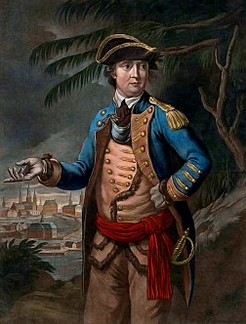Benedict Arnold: From Patriot to Infamous Traitor
Benedict Arnold, born on January 14, 1741, in Norwich, Connecticut, was initially a staunch patriot and officer who ardently supported the cause of the American Revolution. His contributions to the revolution were significant until a dramatic shift in allegiance altered the course of his legacy.
Casey Adams
12/9/20234 min read


Early Life and Family Background
Born in Norwich, Connecticut, Benedict Arnold was the second of six children of Benedict Arnold III and Hannah Waterman King.
A descendant of colonial governors and Puritan leaders, Arnold came from distinguished lineage, but childhood was marred by tragedy.
Only he and his sister Hannah survived to adulthood; the others died young, mostly from yellow fever.
His father, once a prosperous merchant, descended into alcoholism following financial misfortune and the deaths of his children.
As a result, young Benedict abandoned dreams of higher education and instead entered an apprenticeship with his uncles, Daniel and Joshua Lathrop, who operated a successful apothecary and general goods business.
Despite his unstable home life, Arnold demonstrated resourcefulness and a flair for business early on. These traits would later define both his commercial ventures and his military strategies.
Merchant Years and Rising Tensions
By the early 1760s, Arnold had established a thriving pharmacy and bookshop in New Haven. His success allowed him to invest in ships and begin trading in the West Indies.
However, British trade restrictions and new taxes—like the Sugar Act (1764) and Stamp Act (1765)—crippled colonial merchants.
Arnold, like many Patriots, defied these acts and joined the Sons of Liberty, participating in smuggling and even roughing up an informer in 1767.
He was convicted of disorderly conduct but fined lightly, likely due to popular support for anti-British resistance.
In 1767, Arnold married Margaret Mansfield, daughter of the local sheriff, strengthening both his social and financial standing. They had three sons together before her death in 1775.
The French and Indian War: Early Military Interest
Though too young to fight early in the French and Indian War, Arnold eventually enlisted in 1757 and marched with the Connecticut militia.
His company turned back before seeing combat, and later allegations that he deserted in 1758 remain unproven and historically contested.
Nonetheless, his brief service marked the beginning of a lifelong military ambition.
Revolutionary War Heroics
Fort Ticonderoga (1775)
When the Revolutionary War began, Arnold joined the Patriot cause with enthusiasm.
He proposed the capture of Fort Ticonderoga, a British stronghold in New York, and participated in the mission alongside Ethan Allen and the Green Mountain Boys.
The victory gave the Continental Army valuable artillery and a morale boost.
Quebec Expedition (1775–1776)
Arnold led a grueling expedition through the Maine wilderness in an attempt to seize Quebec and prevent the British from seizing control.
Though the effort failed and Arnold was wounded, his courage was widely admired.
Lake Champlain and Ridgefield
In 1776, he led American forces in a delaying action at Valcour Island on Lake Champlain, cleverly stalling the British advance.
In 1777, at Ridgefield, Connecticut, he rallied troops and earned a promotion to major general.
Saratoga Campaign (1777)
Arnold's most famous moment of glory came during the Battles of Saratoga, considered the turning point of the war.
Despite being sidelined by General Horatio Gates, Arnold defied orders and led a bold charge that shattered British lines. He was gravely wounded in the leg, an injury that left him with a lifelong limp.
Discontent and Resentment
Despite his battlefield heroics, Arnold’s relationship with the Continental Congress soured.
He felt overlooked for promotion and was angered that Gates took credit for Saratoga. Adding insult, Congress opened investigations into his finances and accused him of corruption.
Although acquitted of most charges, Arnold was reprimanded by George Washington.
These slights, combined with mounting debt and a lavish lifestyle, pushed Arnold toward disillusionment.
Marriage and the Road to Treason
In 1779, Arnold married Peggy Shippen, the 18-year-old daughter of a Loyalist Philadelphia family. Peggy was intelligent, charming—and politically influential.
She was closely connected to Major John André, head of British intelligence, and may have played a crucial role in persuading Arnold to switch allegiances.
Together, Peggy and Arnold began secret negotiations with the British. Arnold agreed to surrender West Point, a key American fortress, in exchange for £20,000.
The Plot Exposed: September 1780
The plot unraveled when American militiamen captured Major André carrying incriminating documents.
Realizing the plan had been exposed, Arnold fled to British lines just ahead of Washington’s arrival at West Point.
André was hanged as a spy. Arnold, though branded a traitor by the Americans, was rewarded by the British with a commission as a brigadier general, an annual pension, and a lump sum payment.
Fighting for the British
Now a British officer, Arnold led raids against his former comrades.
He burned Richmond, Virginia, in 1781 and launched the Raid on New London, Connecticut, destroying his home state's town and leaving a bitter legacy among locals.
He also fought at the Battle of Groton Heights, just miles from where he was born.
His military actions for the British were often seen as cruel and vindictive, cementing his villainous reputation in American eyes.
Later Years and Death in Exile
After the war, Arnold and Peggy moved to London in 1782. Though King George III received him warmly, many in British society—especially Whigs and military officers—viewed him with suspicion or disdain.
In 1787, Arnold attempted to start a new life as a merchant in New Brunswick, Canada, with his sons. But the public treated him with hostility, and by 1791 he returned to London permanently.
He died on June 14, 1801, in obscurity and relative poverty. His last years were marked by illness, regret, and estrangement from the world he had fought for—and the one he had betrayed.
Legacy: A Name Synonymous with Treason
Benedict Arnold’s name has become a byword for betrayal in American culture. Once considered one of the most daring and skilled American commanders, his legacy was destroyed by his defection.
Yet, historians continue to debate his motives. Was he merely a greedy opportunist? A bitter, misunderstood hero?
Or a man who felt abandoned by a country he had once risked everything to defend?
In truth, Arnold was all of these things—a brilliant general, a flawed man, and a tragic figure whose life forces us to examine the thin line between loyalty and betrayal.
Final Thought
Benedict Arnold’s story is more than just the tale of a traitor—it’s a cautionary epic of pride, ambition, and how recognition, or the lack of it, can turn heroes into villains.
His legacy endures, not just as a name in history books, but as a symbol of the complexities of the human condition in times of revolution and war.











Benedict Arnold

